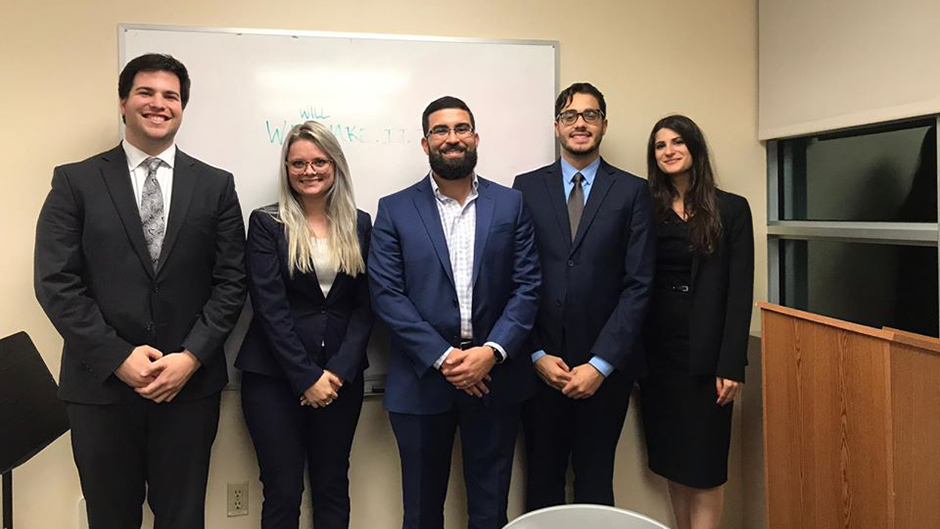A team from the International Moot Court Program —made up of 2L’s Rachel Ruffalo and Matthew Slootsky and 3L’s Harold Dantes-Castillo and Rita Halabi—won the award for the best defendant’s memorandum in the International & European Tax Moot Competition.
The competition is sponsored by the Institute of Tax Law at the Catholic University of Leuven, Belgium and the IFBD, an Amsterdam-based specialist publisher of tax materials, in cooperation with Deloitte, one of the “Big Four” accounting firms. Universities from all over the world take part in the international tax moot every year, including U.S. schools like the University of Virginia, Georgetown, Northwestern, and the University of Florida. IMCP Director and Lecturer in Law Paula Arias and Patricia Brown, the director of the Graduate Tax Program, were co-coaches for the team.
“Winning a best brief award is really tough, since many of the other teams in the competition are from international tax LLM programs in Europe,” said Brown. “Our JD students, several of whom were taking their first tax class while working on the brief, were competing against students who spend much of their time studying the OECD Model Income Tax Convention.” Brown is a former Treasury Department Deputy International Tax Counsel (Treaty Affairs). In that capacity, she was responsible for overseeing the U.S. tax treaty program from 1997 to 2006 and was personally involved in the negotiation of many U.S. tax treaties and protocols, making her an invaluable resource to the team.
“I found it extremely rewarding to learn more about tax treaty models and how to interpret them,” said Slootsky, who along with several of his teammates, is pursuing a Taxation LL.M. from Miami Law’s prestigious Graduate Taxation Program. “Working with the coaches and really improving our writing and oral advocacy skills was really great. I also gained a larger understanding of how other countries interpret models and how it fits under their law, which can differ significantly from the U.S.”
“This year's case was particularly challenging since it involved multiple double tax treaties, multiple jurisdictions, aside from a complex transaction that reflects current tax planning practices related to labor acquisition and mobility plus the development of tech projects,” said Arias. “IMCP decided to participate in the tax moot to provide our students with the exposure to the current international tax issues, to teach other legal tax systems and advocacy styles, and to furnish the opportunity to interact with renowned tax experts.”
Like so much else, the tax moot was greatly impacted by the COVID-19 pandemic. The team initially received permission to compete remotely in the oral arguments, which were to be held March 15-20 in Leuven. Eventually, the competition organizers decided to conduct the oral arguments through recordings and written questions and answers from the judges, but the logistics proved too daunting for the team as Miami Law was in the process of converting to online learning.
Given the circumstances, the team’s achievement offers a huge morale boost to students and testifies to the strength of Miami Law’s international and tax programs. “I am extremely proud of the four students that undertook this moot case,” said Arias. “They were able to learn and develop a cohesive legal strategy and excellent arguments, as reflected in the recognition of their Defendant's memorandum.”
More on the International Moot Court Program
More on Specializing in Taxation

